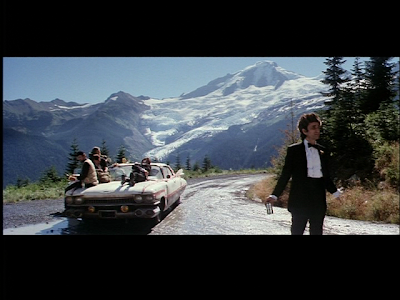At 58 minutes and 48 seconds, the men pull off the road partway up the mountain and have a quick meal of bread, mustard, bologna, beer, and Twinkies. There, while Michael, the natural leader, prepares his rifle, and while the other men lounge and rest and snack, Stan wanders over to the other side of the road wondering how “they changed” the road.
This shot illustrates not only the individual nature of each character involved, but uses Nature as a looming backdrop, foreshadowing the hardship and tragedy that lay just ahead for the soon-to-be soldiers.
Axle and John stand behind the car, eating. They’re not ready to hunt, they’re not ready to help, and they are most certainly not ready to go to war with their buddies. Nick lays on the hood of the car, not sleeping, but waiting. He refuses to eat in an effort to “keep the fear up,” as he puts it. He is in a constant state of readiness, always contemplating, always thinking. Michael, however, is the only one already in his hunting gear and preparing his rifle, demonstrating that he is indeed that man of action that will, before movie’s end, save his friends to whatever degree he is able. Then he looks back at Stan, disgusted by Stan's insolence and stupidity.
Stan, foolishly decked out in a tuxedo and fur hat, separated from the others, complains that “they changed the road,” whatever that means. He becomes the epitome of the know-it-all complainer, that guy who knows what’s wrong, isn’t afraid to let everyone know, and yet is unable to do anything about it or take responsibility for his own mistakes.
And then there are the mountains looming behind. Foreboding. Indomitable. Ruthless. Harsh. Unforgiving. The wide angle shot allows those mountains to take up the entire sky, the entire background. There is, quite simply, no escaping them, nor can Michael and Nick hope to escape their future.
When I first looked at the shot, my natural inclination was that Stan is the subject of the frame, but now I wonder. The men at the car on the left seem equally balanced with Stan off by himself on the right. Add those mountains into the mix, and the subject of the shot almost becomes Micael's relationship with the three– what he has, what he is leaving behind, and what he will soon encounter.
I'm not sure, though. Am I over thinking this last part? What do you think?


I think what you have said so far seems for the most part dead on and I agree with you. I think literally stan is suppose to be the subject of the shot and for people who don't really look intently at film s and try to analyze them like we do in our class would miss what you have said about what the true focus of the shot is. They would never see how the real focus of the shot is the characters relationships before they get shipped off to war and kind of foreshadows what they will be like when they do get shipped off to war. Also I liked how you referenced to the mountains in the background and how they are inescapable and cannot just not be noticed. This really reminds me of the war they are going to enter shortly in their loves. How the war in inescapable and how it cannot just not make an impact on their lives because shortly it will be apart of their lives and it will take over a significant part of their lives and will really make an impact physically and emotionally on their own and other peoples lives. So to answer your question no, I do not think your over thinking this shot its just that most people would not see what you and people maybe from our class would see.
ReplyDelete